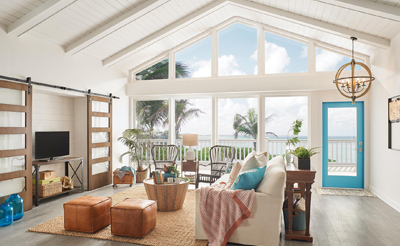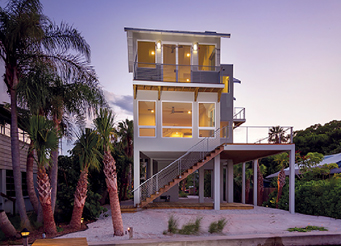
Protect Your Property during Hurricane Season
By Howard Van Natta / Published June 2021

Hurricane season is ramping up in Florida, and if this year is similar to the last, then it will be costly. The cost of the 2019 season may exceed $19 billion. Statistically, mid-September is the most active time for hurricanes and tropical storms, but officially the Florida hurricane season won’t end until November 30. What can you do to protect your Florida home?
There are several products you can invest in to keep your property safe from the worst damage. Impact windows and impact doors are some of the quickest and most effective ways to keep the storm from wreaking havoc inside your house. We’ll cover how you can plan for the risk of hurricanes in Florida before it’s too late.
 Because of its unique topography, Florida sees the worst wind damage from storms. These coastal areas are collectively known as the wind-borne debris region. This is one reason why Florida homeowners need to take special precautions to protect their houses with hurricane windows and hurricane doors.
Because of its unique topography, Florida sees the worst wind damage from storms. These coastal areas are collectively known as the wind-borne debris region. This is one reason why Florida homeowners need to take special precautions to protect their houses with hurricane windows and hurricane doors.
What Is the Wind-borne Debris Region?
The Florida Building Code designates certain areas of Florida as the “wind-borne debris region.” Mostly, these areas are positioned around the coasts of the state, but there are also a few areas designated as wind-borne debris regions that are inland. These inland regions are all within a mile of the coastline with a mean coastal high-water level [the average height of the high waters over a 19-year period], where winds can reach 130 mph. Any location that sees wind speeds of 140 mph or higher is typically designated as a wind-borne debris region according to the Florida Building Code. Further inland, near Orlando, wind speeds tend to top out at 100 mph.
 If a house is located in the wind-borne debris regions, the Florida Building Code stipulates that the property must have some protection from the high winds of a hurricane or tropical storm. Impact doors and impact windows have all been approved in Florida for hurricane preparation and protection. People with homes located in the Miami-Dade and Broward county areas must comply with even stricter building code requirements. The homes’ hurricane protection devices must meet these requirements to get a Miami-Dade Notice of Acceptance (NOA).
If a house is located in the wind-borne debris regions, the Florida Building Code stipulates that the property must have some protection from the high winds of a hurricane or tropical storm. Impact doors and impact windows have all been approved in Florida for hurricane preparation and protection. People with homes located in the Miami-Dade and Broward county areas must comply with even stricter building code requirements. The homes’ hurricane protection devices must meet these requirements to get a Miami-Dade Notice of Acceptance (NOA).
What Are the Steps Florida Homeowners Can Take to Prepare for a Hurricane?
Hurricane winds produce some of the worst and most costly damage to Florida homes. If you own property in Florida, there are many things you can do and products you can purchase to protect your property in the wind-borne regions and inland. The following hurricane preparation tips can be used several months before a hurricane, a few weeks before a hurricane hits land, and a couple of days before the storm reaches the coast.
Months Before Hurricane Season Starts
-
- Stay Informed
When you own property in a region prone to natural disasters like tropical storms and hurricanes, you must keep abreast of developing and worsening weather conditions. Knowing in advance if a storm is brewing off the coast will go a long way to ensuring that you take the necessary steps to protect your property. Consider downloading an app from a Florida weather service and sign up for notifications for storm conditions and impending hurricanes.
- Have Hurricane Impact Doors and Windows Installed
Hurricane windows and hurricane doors are critical for protecting your home from wind and water damage in a hurricane. These incredibly durable impact doors and windows can also protect the home from intruders. With hurricane windows and doors, you’ll save money on hurricane preparation for your house and your energy bills. A Florida home with hurricane windows and doors also offers an attractive feature for prospective buyers if you’re looking to put the house on the market.
- Make an Evacuation Plan
Understandably, most people do not want to leave their home before a hurricane strikes. But in some cases, it may be necessary to leave the area. You don’t want to be caught off guard forming evacuation plans at the last minute, so it’s a good idea to create one ahead of time just in case. Follow these steps for an emergency evacuation plan:
- Find a convenient place to go to. If you have friends or family that live beyond the evacuation zone, coordinate with them ahead of time. Not everyone is lucky enough to have loved ones who live far from hurricane ground zero. If this is your situation, look up hurricane shelters before evacuation becomes necessary. People who have pets will need to be thorough in choosing a pet-friendly facility. Most are not.
- Consider your transportation method and routes. In an emergency evacuation, travel will not be easy, and the roads will be incredibly congested. Look into alternative routes and ways of getting to your friend’s home or a hurricane shelter before an evacuation so you aren’t stranded.
- Outline communication methods. Decide ahead of time how your friends and family will communicate during an evacuation. Write down everyone’s phone number, email address, home address, and shelter address and distribute the copies.
- Stay Informed
One Month Before Hurricane Season Make a Disaster Supply Kit
No matter if you’re bugging out to the hurricane shelter or sheltering in place, you’ll need a supply kit to get you through the storm. Try to build the supply kit at least a month away from hurricane season so you can guarantee you’ll get the supplies you need. In a disaster situation, price gouging occurs, and many required items will be out of stock. Everyone’s supply kit will be different, but start here to give you some ideas of what you’ll need.
- At least three days’ worth of fresh water and non-perishable food for your family and pets
- Battery-powered radio for storm updates and extra batteries
- Flashlights and waterproof matches
- A whistle for signaling emergency responders
- Supply of prescription medications and OTC medications
- Blankets and sleeping bags
- Additional sets of clothing and shoes
- Maps
- Backup phone chargers
- Personal hygiene items
- Paper and plastic eating utensils, plates, and napkins.
Three to Five Days Before A Hurricane Hits
- Trim back the trees and shrubs to keep gutters clear of debris when the winds increase.
- Bring every piece of loose furniture and home furnishings, including trash cans and decorations, inside.
- Take steps to protect your home’s electrical system and wiring from hurricane damage.
- Cover your windows with 5/8 -inch thick plywood boards to prevent the glass from breaking if you do not have impact windows.
- Keep your vehicle’s gas tank full, and if you have a backup generator, keep it full too.
- Outside AC units should be turned off and secured with metal straps to keep them from blowing away in a hurricane. Also, cover the unit with plywood or a tarp to protect it further.
In a hurricane, standard doors and windows sustain a lot of damage when they aren’t made of high-impact materials. High quality impact window and door products are made with the highest industry standards and are designed to withstand hurricane-force winds and rain. These durable doors can also withstand powerful impacts from any high force, including those from home intruders.
What Other Benefits are There When You Instal Impact Windows?
Hurricane impact windows do more than just protect you from storms. They can prevent intruders and save you money on your energy bills.
Howard Van Natta
President, Wright’s Impact Window & Door
Howard Van Natta is president of Wright’s Impact Window & Door. In business for 47 years, Wright’s Impact Window & Door in West Palm Beach, Florida, helps you protect your home the “Wright way” with state-of-the-art premium products manufactured in Florida and installed by a team that strives to provide the highest level of customer service. To learn more or to request an estimate today to fully protect your home and family from hurricane damage, call (833) 950-1888, email marketing@wrightswindow,.or visit wrightswindow.com.




